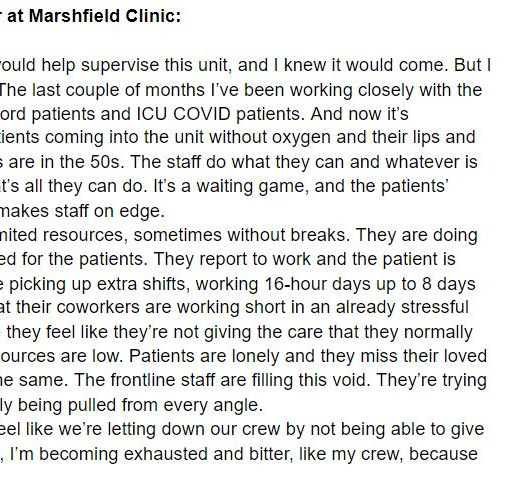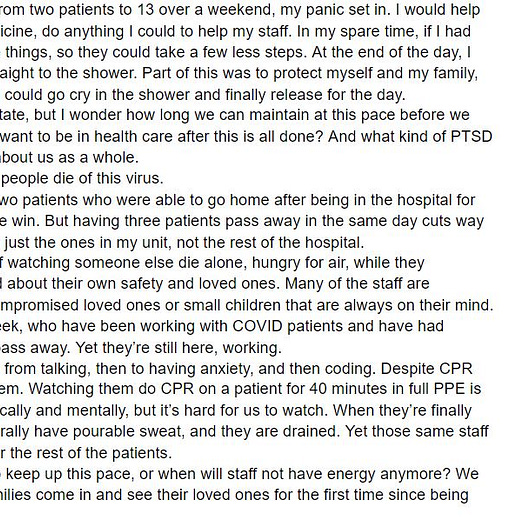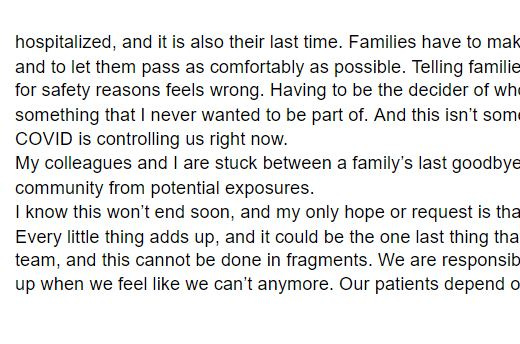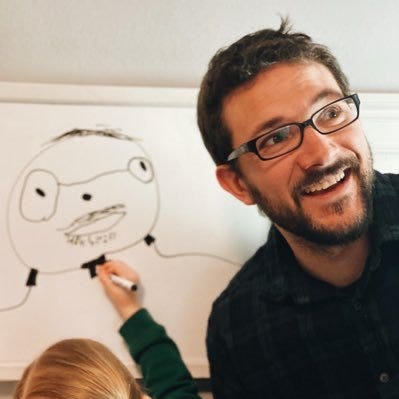Be Thankful for Healthcare Workers. Listen To Them.
Plus: A note for readers.
The Recombobulation Area is a weekly opinion column by veteran Milwaukee journalist Dan Shafer. Learn more about it here.

This has been a hard year. But times of hardship have a way of showing us who is really there for us when we need them most. In so many ways right now, that means frontline health care workers, public health experts, and medical professionals.
As Thanksgiving arrives, we must recognize that these people who have sacrificed so much are deserving of an immense amount of gratitude for what they’ve done for all of us this year. We’ve been saying it for months now, but they are truly heroes.
If you’re a health care worker reading this: THANK YOU! Thank you, thank you, thank you, thank you. We can’t thank you enough.
And while we can all do our part to support health care workers in our individual ways — whether it’s volunteering your time, providing financial support, or voting for leaders who have their back — one thing we can all do right now is listen to them.
They are the experts, they know more than we do, and as this pandemic rages on into the winter, we need to be listening to them now more than ever.
So here’s what some of the frontline workers and healthcare professionals in Wisconsin have been been saying over the last couple weeks. Let’s listen to them.
Jeff Pothof, physician and chief quality officer at UW Health (Milwaukee Journal Sentinel):
“Early on, we managed the surge, we had contingency plans, we were keeping up. But now we’re getting towards the end of that book. If we get there, we don’t have anything magic. We don’t have anything else left up our sleeve. The dam is starting to crack, the water is starting to get in, and we’re not sure how long we can hold the line.”
“Early on in the pandemic, they said health care was the front line of the pandemic. Right now, we’re the last line of defense. It’s really people out in the community that are the front line. The ball is in their court. It’s their actions that determine whether we do OK or not, not ours.”
Michael Walters, emergency medicine physician at Aspirus (Milwaukee Journal Sentinel):
“It’s beyond the point of saying we would like the community’s help. We need their help. We can no longer do this on our own.”
Paul Horvath, emergency room physician at Mayo Clinic (Wisconsin Public Radio):
"I worked a shift in one of the emergency departments the other evening and literally every bed in northwest Wisconsin was full, and hospitals just weren't able to admit new patients. Which means that I had the challenge of managing ICU level care in my ER for hours, which is obviously not routine."
Sue Cullinan, emergency room doctor at Mayo Clinic's Eau Claire hospital (Wisconsin Public Radio):
"Our surge plan expands into the garage, it opens up more beds, we're expanding into lobbies, we're putting people where we wouldn't normally put patients…Not where I'd want to put my grandfather or my grandmother, (though it) may have to happen."
Pam White, chief nursing officer for Mayo Clinic in northwestern Wisconsin (Wisconsin Public Radio):
"It's happening every day. We have families dying in the hospital. It's really hard from a health care perspective because people can drive by the hospital and it looks normal. The walls don't look any different outside the hospital. It's everything that's happening inside the hospital that is really quite challenging and it's hard to appreciate until you've actually experienced it."
Eric Borgerding, president of the Wisconsin Hospital Association (Wisconsin Center for Investigative Journalism):
“Wisconsin has shown an inability, at least from a statewide level, to take steps related to masking or limiting the sizes of gatherings. Whether that can happen in any kind of a meaningful way, through legislation or some sort of collaboration or cooperation between the Legislature and the governor, I think that remains to be seen."
Mary Lowe, nursing assistant in the COVID unit at University Hospital (Wisconsin Center for Investigative Journalism):
“Patients are suffering. People are really sick here. We’re all working really hard to help them get better and to support them. But it’s definitely straining us.”
Dr. Ann Sheehy, University Hospital (Wisconsin Center for Investigative Journalism):
“Our hospitalization rate continues to look like a mountain, and we’re still climbing that mountain.”
“We really need help from the people of Wisconsin to help us shut this down. There’s nothing more we can do as health care providers, without the help of the community at this point. It’s really up to them as to how bad things are going to get inside the walls of the hospital.”
“This is a group that’s really driven to take good care of patients and will continue to go above and beyond until they just can’t.”
Dr. Ben Layman, administrative officer for the Wausau region of the Marshfield Clinic (Wausau Daily Herald):
"There is no cavalry coming. There is not a COVID-safe place today in central Wisconsin or northern Wisconsin. We are failing because of our own actions.”
“I'm not sure how much longer (front-line workers) can deal with this repeated emotional trauma. They feel disheartened, they feel like their communities have given up. Unless we change our behavior this very day, we will soon see chaos and true disaster."
Healthier Storch, nurse manager at Marshfield Medical Center, on the surge (WSAW):
“We could handle up to four patients in our negative pressure rooms and they said, ‘well, we need to go beyond that.’ So we said, ‘okay, one half of our hall,’ so half of our patients would be COVID positive. Then, that Monday came, and like I said, it’s like two weeks ago if I remember right, and patients just kept coming”
“It’s going to get to a point where we can’t care for all of these patients and there’s going to be many ethical decisions as health care workers that we have to make of who we can treat with what equipment we have and we do not want to get to that point.”
“It’s just heart-wrenching, and to watch my nurses and they’re in nursing for a reason. We do everything we can for our patients, but I’m afraid of what’s going to happen when this is all over with how much of a toll emotionally this is going to leave on nurses.”
Dani Reed, critical care nurse at Marshfield Medical Center-Eau Claire (Eau Claire Leader-Telegram):
“I put on speaker phone next to the patient’s ear while their loves ones tell the patient how much they love them and what a good husband, dad or grandpa they were while I try to stifle my sobs in the background, unable to wipe the tears from my face because of all the PPE.”
“Not only are we their nurse, but we have to be their emotional support as well. We’re their lifeline.”
“I saw some people were saying that after the election this virus was just going to miraculously go away. If you could see what I see, the virus is still here and it’s not going away. It’s real. We’re never going to get over this if people don’t take it seriously.”
“I love being a nurse, but there are days when I think I don’t know if I can handle this anymore. Just do what we need to do so that we can stop this because I don’t want to see another person die. I don’t want to have to tell another wife that your husband passed away. I just want to get this under control.”
Dr. Michael Erdmann, chief of staff of the Milwaukee VA Medical Center (WPR):
"The majority of our patients don't have COVID and they have diseases that we need to take care of. It hurts me to not be able to provide all of the things that we’d like to do under normal situations. But this is not normal times and we need to protect our veterans as best we can."
"We don't want to inadvertently infect one of our elderly loved ones just because we wanted to share a meal at Thanksgiving time. We need to remember that it's not too far off that we’re going to have effective vaccines, it appears. And we can get back to gathering together as families and loved ones."
Dr. Alison Schwartz, an infectious disease physician at SSM Health in Janesville, Wisconsin (Reuters):
“Everyone (is) continuing to go about their lives, (but) we sort of feel like we’re drowning.”
Ben Weston, director of medical services for the Milwaukee County Office of Emergency management (Milwaukee Journal Sentinel):
"We enter Thanksgiving very aware of the catastrophic effects that gatherings could have in increased transmission of this disease.”
“‘I feel fine’ means very little in regards to COVID infection. Everyone feels fine before they don’t. And everyone feels fine when they’re at their very most contagious. That’s a huge part of the reasons why COVID is so dangerous, why the disease has been so hard to control.”
Heather Storch, a nurse at Marshfield Medical center in Marshfield, Wisconsin (PBS News Hour):
“As a manager, I have been in nursing for 14 years, and I never imagined that this is something that we would have to go through. The decisions that I need to make on a daily basis of allowing a family member to come and see one of their family members who is dying for the last time is extremely hard.”
Dr. William Melms, chief medical officer at Marshfield (PBS News Hour):
“We have enough space to take care of these patients. We cannot create more people. And it is the staff. It's physically demanding to take care of these patients. And, more importantly, it's an emotional, demanding thing to do.”
“We're extremely concerned about (Thanksgiving). We feel like we're in a little bit of an eye of the storm right now, but we will be on the leading edge of that storm within one to two weeks after Thanksgiving. I have no doubt about that.”
“This is trauma that these individuals are dealing with on a day-in and day-out basis...We worry about burnout. We worry about turnover. We are trying to mobilize staff to become inpatient staff, or at least to be able to help the inpatient staff, to provide them some relief for the duties that they have to do. We have a program called Helping Hands, where we're bring in staff of all sorts, receptionists, M.A.s, anyone that's willing to lend a hand on the inpatient side to do any of the nursing tasks to help relieve some of their burden. We are looking to get contracted staff wherever we possibly can. That's a difficult thing, because surging is occurring around the country now. So, staff is rare.”
Dr. John Raymond, Medical College of Wisconsin (UpNorth News):
“Where the pandemic is actually taking hold right now is in small family gatherings and leisure time activities. And as we enter the holiday season, if people ignore the recommendations of public health officials, it’s very likely that we will overwhelm the capacity of our health systems who take care of everybody, whether they have COVID-19 or not.”
“It’s nice that the community calls healthcare workers heroes and early on were providing free food and things like that. It’s more meaningful if people actually take their personal responsibility seriously.”
Dr. Nathan Grunewald, chief innovation officer at Sauk Prairie Hospital (WKOW):
"We've spent countless hours on the phone to find beds for ICU level patients. We've had experiences where we've called throughout the entire state trying to find ICU beds."
"The reality is we're on an unsustainable trajectory of COVID-19 infections in our local, regional area. Our community members represent the front line of the battle against the coronavirus. This is a war that we're in."
Teresa Weiler, a nurse and COVID unit supervisor at Marshfield Medical Center (Appleton Post Crescent):
"Who will want to be in health care after this is all done? What kind of PTSD will we all suffer?"
Watch her speak here.
Wisconsin Hospital and Health System Physician Leaders Issue Joint COVID-19 Safety Message
“As Wisconsin physician leaders, we see the growing toll this disease is taking on our health care system, straining hospital capacity and stressing our nurses, doctors and others – those “health care heroes” we are all grateful for, but who now need your help to stem the surge of COVID-19 patients in our hospitals and clinics.”
An Open Letter to the People of Wisconsin, from UW Health faculty, staff and colleagues from around the state:
“Wisconsin is in a bad place right now with no sign of things getting better without action. We are, quite simply, out of time. Without immediate change, our hospitals will be too full to treat all of those with the virus and those with other illnesses or injuries. Soon you or someone you love may need us, but we won’t be able to provide the life-saving care you need, whether for COVID-19, cancer, heart disease or other urgent conditions. As health care providers, we are terrified of that becoming reality.”
Medical College of Wisconsin: “This is Real: A Physician Plea”
There is surely more that health care professionals around Wisconsin have been saying. Pay attention to them. Listen to them. They are our way out of this.
A Thanksgiving note for subscribers, supporters and readers of The Recombobulation Area:
The Recombobulation Area has had quite the year in 2020, and with Thanksgiving this week, I want to extend my thanks to you.
You have helped make this column and this little community we’ve built around it truly something special. Our readers and supporters are the absolute best, and I couldn’t say enough good things about all of you and what you’ve meant to helping this small piece of independent media here in Wisconsin grow. I am extremely grateful for each and every one of you.
As we continue to endure this pandemic (and the recession, historic protest movement, and unprecedented election that has consumed us this year), independent media is as important as ever. The Recombobulation Area gets 100% of its support from you, the reader. That is a very special thing. If you’re not yet a paid subscriber, consider becoming one today. This week, we have a Thanksgiving Special Offer where you can get 30% a full-year subscription.
In 2020, we have already exceeded our readership and subscription goals for The Recombobulation Area. We are looking ahead to the future to explore new ways to keep building, and we’re excited about what that future can bring. The hundreds of thousands of people who’ve read The Recombobulation Area over the past year have shown that there is a real appetite for bold, opinionated, progressive-minded journalism in Wisconsin.
These next few months, however, will look a bit different around here. My wife and I are expecting our second child in January. We are so thrilled about what’s next for our family, and we can’t wait to welcome our little girl into the world. She’s been a true source of hope for us this year, and we just can’t wait to meet her.
So, what this means for the column is that it will be taking a backseat for a little while. As much time as I devote to this project, The Recombobulation Area is still only a part-time job, and I am still, more than anything, a stay-at-home Dad. Being a Dad will always be my biggest priority. I hope to someday make The Recombobulation Area a full-time operation, but that someday will not be coming in early 2021. There will still be new columns over the next few months, but publication will be less frequent.
But with an eye toward the future, 16 months into this project, I am as optimistic as ever about The Recombobulation Area, and about work we can continue to do together. While these columns might just have one byline, this is far from a solo project. This effort has always been a collaborative one, and one that is about creating something new and different as a community. I want to keep hearing from that community, and you can reach me directly at dan.shafer.media@gmail.com. Let’s keep building.
Thank you again to all of you. Your support means the world, and I am eternally grateful. Have a safe and happy Thanksgiving.
- Dan
PS. There’s been some talk of a Recombobulation Area Readers Virtual Happy Hour. We’re going to make this happen sometime in the next couple weeks. Stay tuned…
Dan Shafer is a journalist from Milwaukee who writes and publishes The Recombobulation Area. He previously worked at Seattle Magazine, Seattle Business Magazine, the Milwaukee Business Journal, Milwaukee Magazine, and BizTimes Milwaukee. He’s also written for The Daily Beast, WisPolitics, and Milwaukee Record. He’s on Twitter at @DanRShafer.
Subscribe to The Recombobulation Area newsletter here and follow us on Facebook at @therecombobulationarea.
Follow Dan Shafer on Twitter at @DanRShafer.






